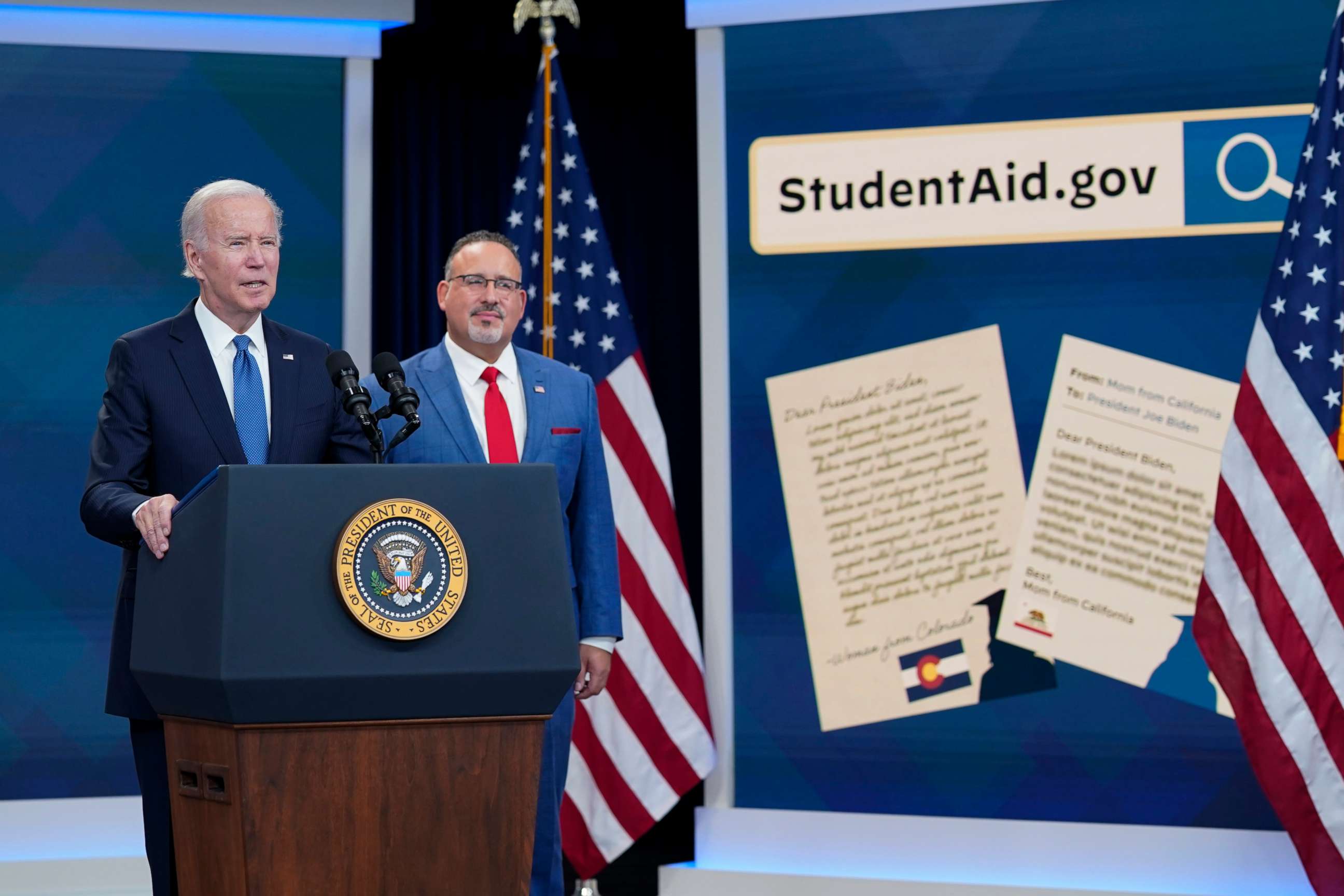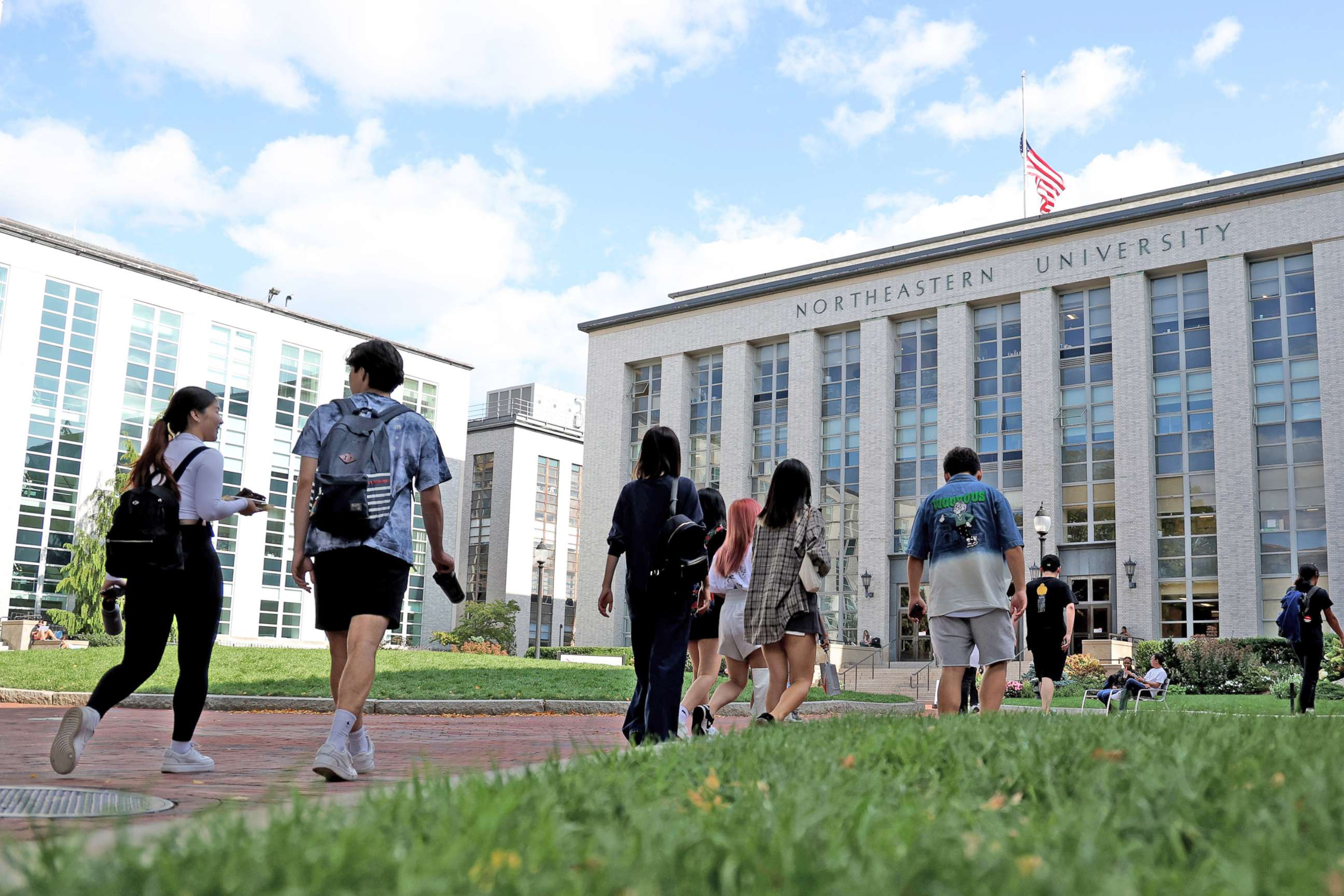Watch out for student loan forgiveness scam attempts, President Biden warns
It could be a familiar call.
"Hey, it's Elizabeth with Student Advisors," a warm, professional voice began in a voicemail left on Sept. 13, weeks after the Biden administration announced it would be offering up to $20,000 in student loan forgiveness for the nation's tens of millions of borrowers.
"I'm just giving you a call in regards to your school loan. I do have you prequalified here for the updated forgiveness program and possibly even loan discharge. It is imperative that we go over the details just as soon as possible because it does look like your status is going to expire soon. But I will go ahead and keep it in pending status for you for now," the voice -- "Elizabeth" -- said in the voicemail, before leaving a callback number.
On Monday, President Joe Biden formally announced the opening of the federal student debt cancellation application, following a "beta" test of the process over the weekend which had drawn in 8 million applicants.
While mostly celebrating the political implications of his policy, Biden also carved out a warning for eligible borrowers: Be wary of increased scam attempts, which prey upon people desperate to have their school loans forgiven.

"I'm also focused on going after fraudsters who call borrowers," the president said. "If you get a call pretending they're from the government trying to help them with your loans, let's be clear: Hang up. You never have to pay for any federal help for the student loan program."
"If you get any questionable calls, please tell us by going to reportfraud.ftc.gov," he said.
On Tuesday in a consumer report, the Federal Trade Commission said scammers were already "on the move" one day after the application's official launch -- trying to get borrowers' money and personal information.
The voicemail left on Sept. 13 is a prime example of the type of scam attempts that Biden is cautioning borrowers against. It includes a number of fraud indicators, Federal Trade Commission staff attorney Michelle Grajales told ABC News, like the fact that "Student Advisors" is not an accredited loan servicer and that "Elizabeth" claimed fast action was required from the borrower so they didn't lose their benefits.
Contact from a servicer other than the one whom an individual is enrolled with and if a servicer charges a fee for the loan application process are other "major red flags," Grajales said, echoing Biden's warning.
All benefits of the forgiveness program are available for free through an application from borrowers' own loan servicers or through the government website studentaid.gov.
"DON'T pay anyone who contacts you with promises of debt relief or loan forgiveness. YOU DO NOT NEED TO PAY ANYONE TO OBTAIN DEBT RELIEF," the Department of Education said in a blog post this month called the "Do's and Dont's of Student Debt Relief."
Biden's warning on Monday follows a White House fact sheet released on Oct. 5, where his administration advised against student loan scam attempts that had begun even before he announced the cancellation policy.

The administration said then that it would be ramping up enforcement between the Department of Education, the Federal Trade Commission and the Consumer Financial Protection Bureau, the Department of Education's Office of Inspector General, Secretaries of State, state banking regulators and state attorneys general, among other bodies -- aiming to catch more scammers and increasing shared information between entities so they might work faster in each state to stop fraud.
Student loan complaints are shared across federal and state agencies using the Federal Trade Commission's Consumer Sentinel Network, which connects about 3,000 federal, state, local and international law enforcement users. Online advertisements are one component of the FTC's complaint system, along with calls, texts and emails.
"At least in a general sense, student loan debt relief complaints appear to be going up this year as opposed to last year," Grajales said, noting findings from the FTC network. She said that was "also continuing kind of an upward trend from 2019 and 2020."
Be wary of loan scams via search engine: Watchdog
Tech Transparency Project, a nonprofit organization that monitors tech companies, released an investigation in July, before the Biden administration had even announced its forgiveness policy. The organization found that a significant number of ads running on search engines like Google were student loan scams, either posing as government agencies or trying to gather information or finances from people but never delivering them services.

According to the report, 12% of the ads that appeared in Google searches for key terms around student loan forgiveness were scams.
"Google's response was that these things aren't allowed," Tech Transparency Project Director Katie Paul said in an interview. The nonprofit followed their July report with an October check-in, which found that certain search terms used in their July report continued to return scam ads -- though the number had somewhat reduced.
"This change shows that Google is clearly capable of more effective enforcement. The question is why that effective enforcement didn't come until there was a very public warning about these types of scams from the highest level of government, and why Google's action against companies profiting from those scams isn't the status quo," Paul said.
In response to questions from ABC News on why the search engine had served loan scam ads, according to the Tech Transparency Project, Google said that they were "committed to combating financial fraud in ads and protecting our users and advertisers from scammers" through a number of policies in place to enforce the fraud and an investment in verification processes.
On Tuesday, however, following the official loan application rollout, Paul said she noticed another increase in the search-engine advertisements.
"Google is still allowing advertisers to redirect borrowers searching for the administration's debt relief application. If Google was actually focused on delivering the most authoritative information, it would not allow the highest bidders to jump ahead of the government's relief efforts," she said.
How to avoid student loan scammers
The Federal Trade Commission warns students and borrowers not to share personal information, especially Federal Student Aid ID, Social Security numbers or credit card information, with any website or person other than on the government's official portal -- and not to upload or attach any documents.
The agency has also stressed that there is no fee to apply for student debt forgiveness.
Since the student loan announcement in August and Biden's October push to clamp down on fraud, the Federal Trade Commission said they have issued blog posts that have gone out to 300,000 subscribers, educating those people on how to spot scams and avoid fraud. They've also engaged in social media campaigns in both English and Spanish.
Grajales said the agency's chairwoman, Lina M. Khan, has met with senior officials at other agencies to coordinate reducing scam attempts.
"My message to fraudsters looking to cheat the American people is don't do it. We're gonna hold you accountable," Biden said on Monday.
The FTC is equipped to handle the fraud cases, they say
The Federal Trade Commission said it is leading the charge to enforce crackdowns on individuals or companies who are attempting to perpetuate fraud.
Grajales, the staff attorney, told ABC News that the agency collects complaints and then shares them with law enforcement agencies nationwide.
"We're active in this space," Grajales said, as the agency has recovered hundreds of thousands of dollars for borrowers already engaged in student loan scams over the past five years.
"We seek to get money back for consumers as well as to put these people out of business and get what we call lifetime bans for the wrongdoers. And we are successful in most of these lawsuits," Grajales said.
Like Biden suggested, the Federal Trade Commission said the best place to record instances of fraud is reportfraud.ftc.gov. Even if an individual did not fall victim to fraud, they should report any attempts against them.
--ABC News' Ben Gittleson and Cheyenne Haslett contributed to this report.




